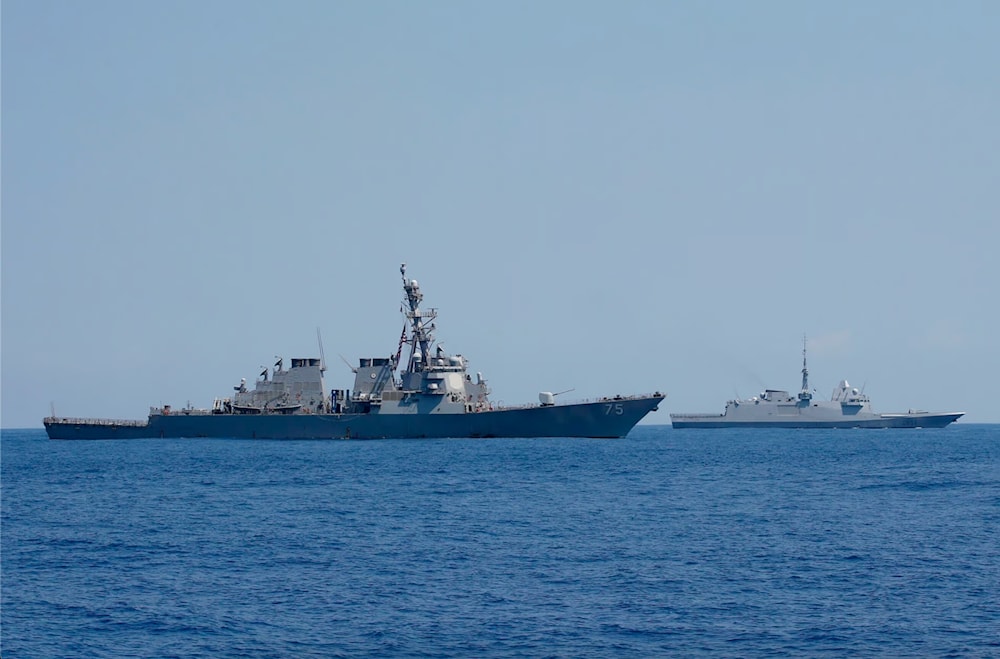US trying to convince shippers to resume sailing via Red Sea: Reports
The Pentagon is reportedly in regular communication with the industry to assess needs and affirm international commitment to ensuring secure passage, a pentagon official said.
-

The American destroyer had been patrolling the area as part of Operation Prosperity Guardian (AFP)
Bloomberg reported on Friday that the US is implementing measures to provide reassurance to shipping companies regarding the safety of utilizing the Red Sea and Suez Canal for cargo deliveries, despite ongoing attacks by the Yemeni resistance.
According to the report, Air Force Lt. Col. Bryon McGarry, a spokesperson for the Defense Department in the Middle East and Africa, stated that the Pentagon is communicating with the industry almost daily. Their objective is to assess needs and offer assurance that the international community is committed to assisting with secure passage.
"We are not putting a timeline on this operation," McGarry said. "We’ll stand firm with our partners in the region for as long as it takes until the threat to international shipping in these waterways has ceased."
Since the start of the genocide in Gaza, the Yemeni resistance has been actively undertaking the task of blocking the Red Sea route for Israeli-linked vessels. The Ansar Allah movement stated they would not cease their operations unless the war on Gaza came to a complete halt.
A week ago, US Secretary of Defense Lloyd Austin declared the establishment of a multinational operation named Operation Prosperity Guardian aimed at safeguarding the Red Sea in response to the escalating attacks by the Yemenis on cargo vessels. He disclosed that the UK, Bahrain, Canada, France, Italy, the Netherlands, Norway, the Seychelles, and Spain would participate in the mission. In response, the Yemeni resistance vowed to target any ships aligning with the US-led maritime coalition.
Read more: US allies hesitant to join anti-Sanaa Red Sea coalition
China, Spain, Djibouti not to partake in naval coalition
Spain announced last Sunday its decision not to partake in a US-led coalition aimed at safeguarding Red Sea shipping for Israeli-linked vessels from operations carried out by the Yemeni armed forces.
Spain's government has recently maintained a stance generally inclined towards Palestine and on Sunday, a spokesperson for the defense ministry informed AFP that Spain "will not participate."
China also appears to be dismissing Secretary of State Antony Blinken's request for Beijing to partake in the coalition after Chinese Foreign Ministry spokesperson Wang Wenbin stated on Thursday that "relevant parties, especially major countries with influence, need to play a constructive and responsible role in keeping the shipping lanes safe in the Red Sea."
Djibouti further announced on Thursday its reservation from partaking in the naval coalition after the country's Foreign Minister Mahmoud Ali Youssouf affirmed that Djibouti does not condemn the attacks from Sanaa in the Red Sea and the Bab el Mandeb, considering them a "legitimate relief for the Palestinians."
He added that Djibouti is reluctant to participate in the alliance despite that the suspension of maritime trade in the Bab el Mandeb could potentially harm Djibouti's economy.
He pointed out that maritime trade is a fundamental part of Djibouti's national income, and if the Bab el Mandeb were to be closed, "the economy would collapse."
"If Palestine does not find relief elsewhere, may God bless the relief provided by the Yemenis," he said.
Read more: Yemeni Armed Forces have 'upper hand' over US in Red Sea

 3 Min Read
3 Min Read








